Collection: CBD Oil For Osteoarthritis
Osteoarthritis, a prevalent chronic joint condition, affects millions of people around the world, causing pain and reduced mobility in the joints. While there is no cure for osteoarthritis, the pain can be managed, and the damage to the joints slowed or even stopped with the right treatment. As more people seek holistic, less invasive treatments for a variety of medical conditions, CBD oil has emerged as an effective, natural solution to treat inflammation and provide pain relief for individuals suffering from osteoarthritis.
-
Book your free consultation
Get expert guidance on natural ways to support sleep, stress, and more.
BOOK NOW
-
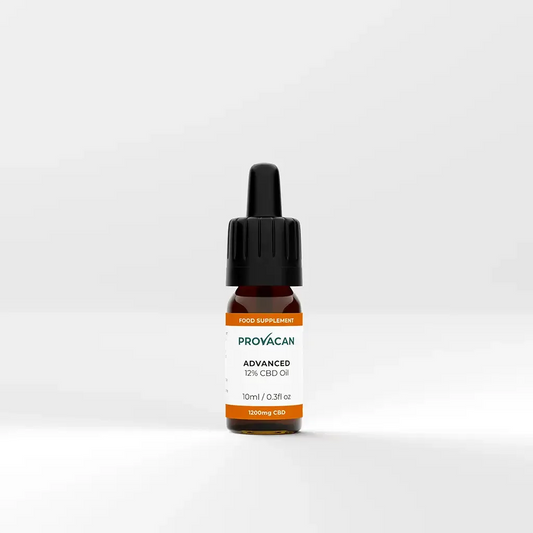
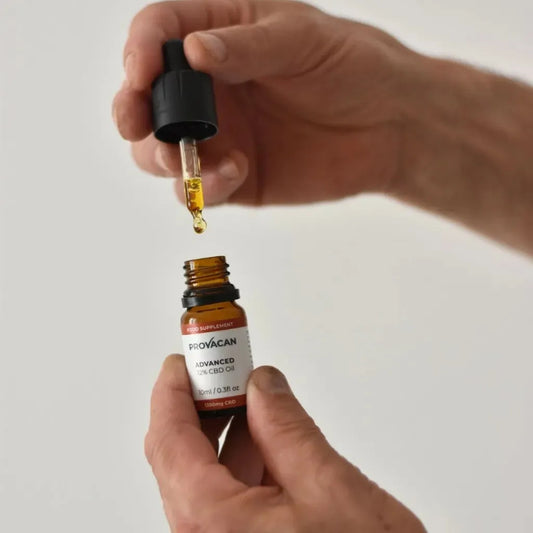 Black Friday: 30% off
Black Friday: 30% offProvacan Advanced CBD Oil | 1200mg / 12% CBD, 10ml
4.7 / 5.0
(213) 213 total reviews
£49.99£35.00Black Friday: 30% off -
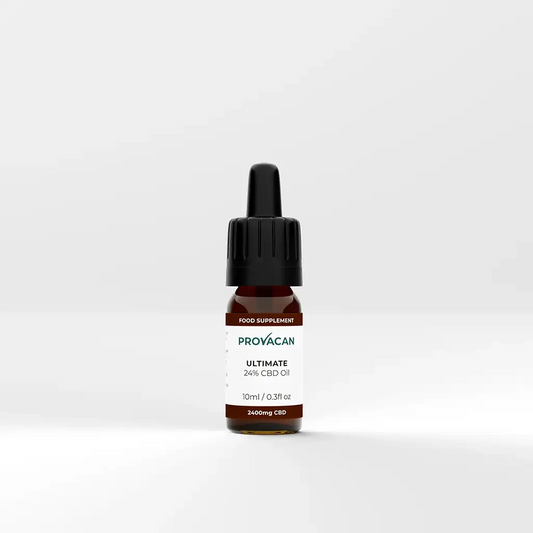
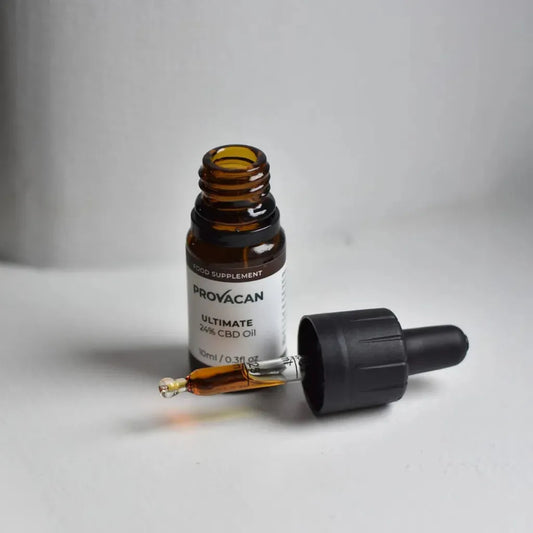 Black Friday: 30% off
Black Friday: 30% offProvacan Ultimate CBD Oil | 2400mg / 24% CBD, 10ml
4.7 / 5.0
(164) 164 total reviews
£79.99£56.00Black Friday: 30% off -

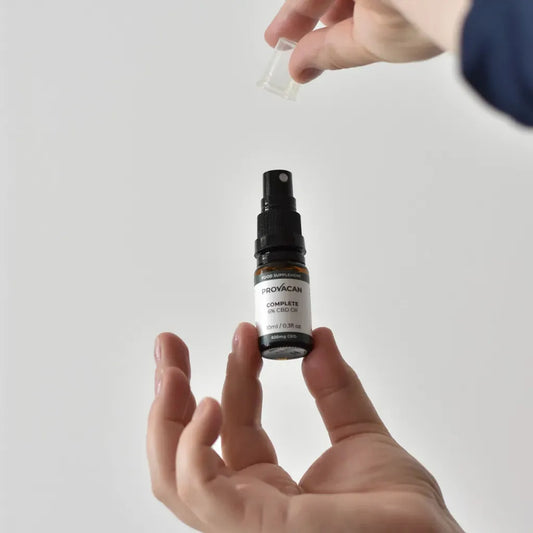 Black Friday: 30% off
Black Friday: 30% offProvacan Complete CBD Oil | 600mg / 6% CBD, 10ml
4.7 / 5.0
(194) 194 total reviews
£34.99£24.50Black Friday: 30% off -
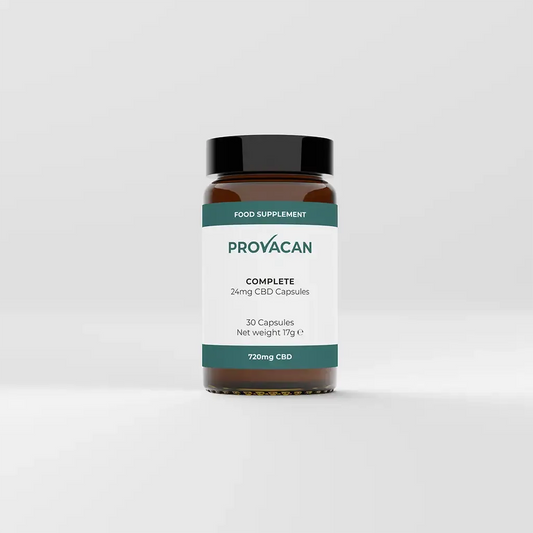
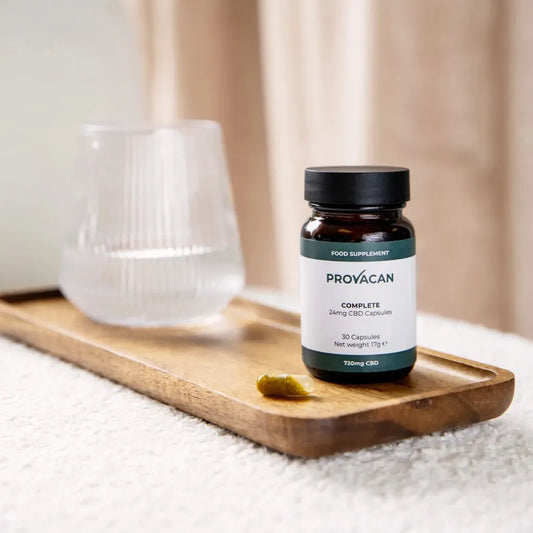 Black Friday: 30% off
Black Friday: 30% offProvacan Complete CBD Capsules | 24mg CBD per capsule, 30 Pack
4.6 / 5.0
(167) 167 total reviews
£34.99£24.50Black Friday: 30% off -
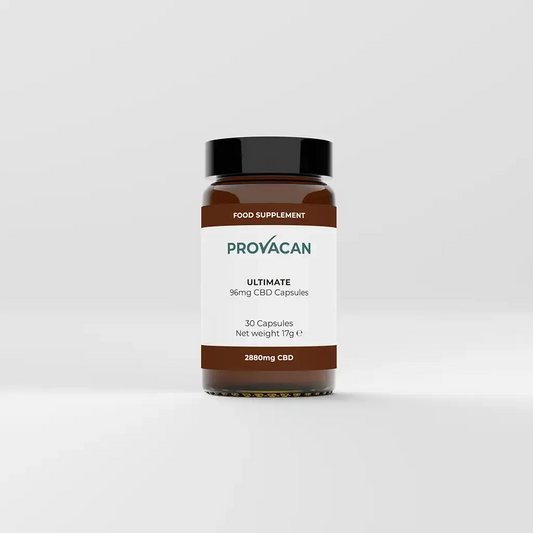
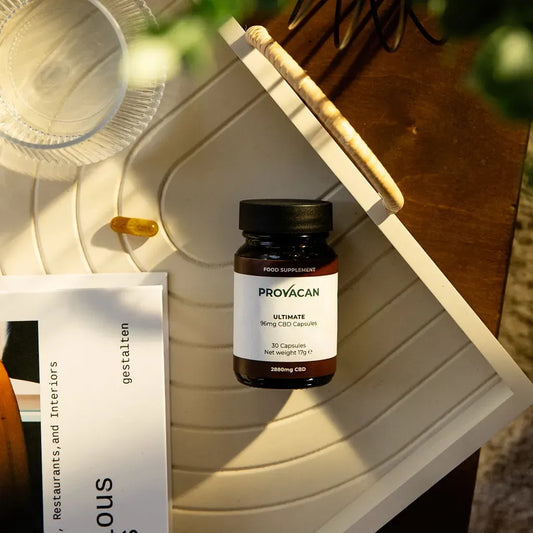 Black Friday: 30% off
Black Friday: 30% offProvacan Ultimate CBD Capsules | 96mg CBD per capsule, 30 Pack
4.6 / 5.0
(70) 70 total reviews
£89.99£63.00Black Friday: 30% off -

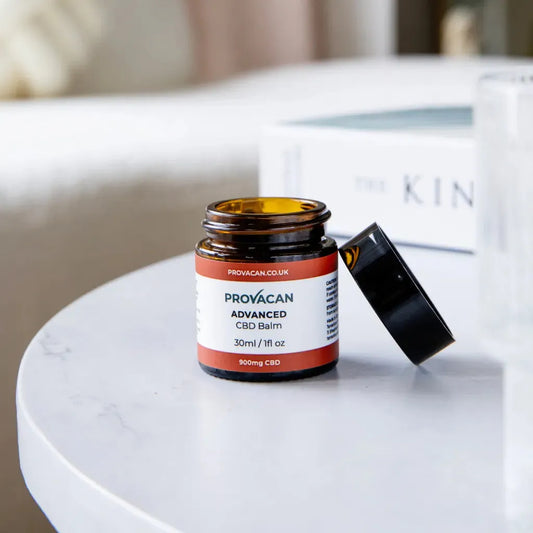 Black Friday: 30% off
Black Friday: 30% offProvacan Advanced CBD Balm | 900mg / 3% CBD, 30ml
4.6 / 5.0
(70) 70 total reviews
£39.99£28.00Black Friday: 30% off -
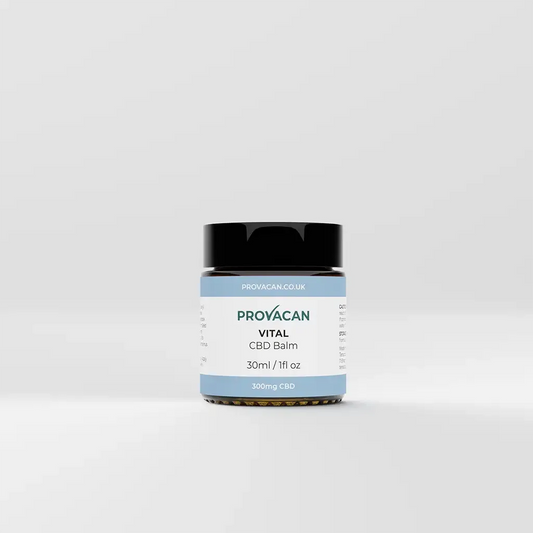
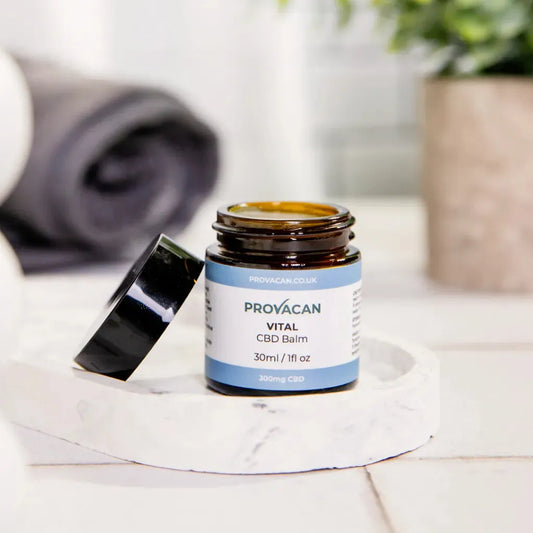 Black Friday: 30% off
Black Friday: 30% offProvacan Vital CBD Balm 300mg CBD / 1% CBD, 30ml
4.5 / 5.0
(4) 4 total reviews
£22.99£16.10Black Friday: 30% off
Key Takeaways:
- Potential Anti-inflammatory and Pain-relieving Benefits: CBD oil is recognised for its potential to alleviate osteoarthritis symptoms, particularly inflammation and pain, by interacting with the endocannabinoid system.
- Various Forms and Application Methods: Provacan provides diverse CBD products such as oils, capsules, and balms, each offering unique benefits for effective and tailored osteoarthritis management.
- A Natural Alternative to Traditional Treatments: CBD oil presents a promising, holistic approach to managing osteoarthritis when compared to conventional treatments, potentially offering symptom relief with minimal side effects.
Understanding Osteoarthritis: Symptoms And Challenges
Osteoarthritis, the most common form of arthritis, affects millions of individuals. It is characterised by the degeneration of cartilage, the tough, flexible tissue that cushions the joints. As the cartilage wears away, bones begin to rub against each other, causing pain, swelling, and difficulty in movement.
Symptoms Of Osteoarthritis
The symptoms of osteoarthritis can vary in severity and often develop slowly over time. Key indicators include:
- Joint pain: Typically manifests during or after movement.
- Stiffness: Most noticeable upon awakening or after a period of inactivity.
- Tenderness: Even light pressure near the joint can cause discomfort.
- Loss of flexibility: Reduced range of motion that may go as far as inhibiting the performance of daily tasks.
- Grating sensation: Individuals may hear or feel a grating sensation when using the joint.
- Bone spurs: Extra bits of bone, which feel like hard lumps, can form around the affected joint.
Challenges In Managing Osteoarthritis
Managing osteoarthritis is multifaceted and extends beyond mere pain management. Challenges include:
- Lifestyle modifications: Incorporating routine exercise, losing weight, and maintaining an active lifestyle are crucial but can be difficult to sustain.
- Chronic pain: Managing pain that varies in intensity can disrupt sleep and everyday activities.
- Psychological impact: Chronic conditions can affect mental health, leading to depression or anxiety, as coping with persistent pain can be taxing.
- Treatment adaptation: Over time, the effectiveness of certain treatments might diminish, necessitating changes in management strategy.
These symptoms and challenges highlight the need for innovative treatments and pain-management strategies.
Comparing CBD Oil With Traditional Osteoarthritis Treatments
Osteoarthritis, a prevalent joint disorder, causes significant physical discomfort and mobility limitations for those affected. Traditionally, the condition is managed through a variety of treatments, including nonsteroidal anti-inflammatory drugs (NSAIDs), corticosteroid injections, and in some severe cases, surgical intervention. Each of these traditional options carries potential risks and side effects. NSAIDs can cause gastrointestinal problems and are associated with an increased risk of heart issues, while corticosteroids can lead to weakened bones and higher susceptibility to infections.
CBD oil offers a contrasting approach to managing osteoarthritis symptoms. Unlike traditional treatments, which mainly focus on pain relief and inflammation reduction, CBD oil operates through interaction with the body’s endocannabinoid system. This system influences various bodily functions, including pain perception and inflammation. Provacan’s CBD oil, characterised by superior purity and extraction methods, ensures that it interacts efficaciously with these biological systems, potentially reducing both inflammation and pain without the side effects associated with many pharmaceutical drugs.
Scientific research continues to evolve in recognising how CBD oil can specifically benefit those with osteoarthritis. Studies suggest that CBD may not only ease symptoms owing to its anti-inflammatory properties but also assist in protecting the joints from further damage. This protective capacity is particularly interesting as it offers a dual approach – managing symptoms and potentially preventing the progression of the condition.
It's essential to balance the dialogue between traditional and newer therapeutic avenues like CBD oil. Provacan consistently bases its product development on the latest advancements in CBD research, ensuring that our customers receive the most effective and safe formulations. Ideal for those seeking alternative treatments, Provacan’s CBD oil represents a promising substitute to traditional osteoarthritis interventions by targeting underlying mechanisms of the disease with minimal adverse effects.

How CBD Oil Interacts With The Body's Endocannabinoid System
CBD oil interacts with the body's endocannabinoid system (ECS), a complex network of receptors and neurotransmitters that plays a crucial role in maintaining homeostasis. The ECS regulates a variety of physiological and cognitive processes, including inflammation, pain sensation, and immune system responses.
When CBD oil is introduced to the body, it interacts primarily with two types of receptors in the ECS: CB1 and CB2. CB1 receptors are predominantly found in the brain and central nervous system, while CB2 receptors are more commonly located in peripheral organs and cells associated with the immune system.
CBD primarily interacts with CB2 receptors, which play a significant role in managing inflammation and pain. By activating these receptors, CBD may help reduce the inflammation associated with osteoarthritis and alleviate pain. Unlike THC, another well-known cannabinoid, CBD does not bind directly to these receptors but influences them indirectly. This interaction helps modulate the receptor activity and promote a natural balance in the ECS, potentially leading to symptom relief.
Moreover, CBD is also thought to influence other non-cannabinoid receptor systems in the brain, such as the serotonin 5-HT1A receptor, which could further contribute to its anti-inflammatory and pain-relieving effects. This interaction with multiple systems within the body suggests that CBD could offer a holistic approach to managing osteoarthritis symptoms, making it a valuable component of a comprehensive treatment plan.
Potential Benefits Of CBD Oil For Osteoarthritis Pain Relief
There is a variety of medications available today for treating osteoarthritis. However, many individuals suffering from osteoarthritis decide to seek effective, non-addictive pain relief that goes beyond traditional pharmaceuticals. Here, CBD oil emerges as a compelling alternative backed by scientific research and studies.
CBD is a naturally occurring compound found in cannabis plants. Unlike its counterpart THC, CBD does not induce psychoactive effects, making it an appealing option for those seeking relief without the high. Let’s take a look at some of the ways that CBD can help treat and manage osteoarthritis.
Anti-Inflammatory Properties
One of CBD’s potential benefits in managing osteoarthritis is its anti-inflammatory properties. Chronic inflammation plays a pivotal role in the progression of osteoarthritis, exacerbating pain and discomfort. Research indicates that CBD can modulate the body's inflammatory response by interacting with the endocannabinoid system. This system is crucial for maintaining biological harmony and healing within the body. By reducing inflammation, CBD oil may decrease the pain associated with swollen and tender joints.
Pain Management
Managing pain is paramount for individuals with osteoarthritis. CBD oil has been studied for its potential role in pain relief by affecting the brain’s pain receptors. According to various studies, CBD may help reduce pain intensity without inducing the side effects often associated with conventional pain medication. For those looking for natural alternatives, CBD oil presents a promising option.
Improved Mobility
With reduced pain and inflammation, improved mobility is a natural result. Users of CBD oil have reported enhanced joint flexibility and a decrease in stiffness, factors that contribute significantly to the quality of life. Provacan’s CBD oil, through its high standard of production and commitment to excellence, aims to deliver these therapeutic benefits effectively, helping users to regain control over their mobility and daily activities.
Sleep Enhancement
Sleep disturbances are commonly reported by those suffering from osteoarthritis due to persistent pain. CBD’s potential to aid in sleep improvement is another benefit that is still being researched. By promoting more restful and deeper sleep, CBD oil may help improve the overall health and well-being of osteoarthritis patients, further supporting their journey to recovery.
Implementing CBD oil as part of an osteoarthritis management plan holds promise, backed by Provacan’s dedication to rigorous scientific validation and supreme product purity. While ongoing research continues to redefine what we know about CBD and its capabilities, the current findings are encouraging for those seeking alternative therapeutic options.
Different Forms Of CBD: Oil, Balmss, and Capsules
When considering CBD oil for osteoarthritis, it's important to understand the different forms available and how they can cater to individual needs and preferences. Each form offers unique benefits and methods of application or ingestion, which can influence the effectiveness of the treatment.
CBD Oil
CBD oil tinctures are one of the most popular forms due to their ease of use and rapid absorption. They are typically applied sublingually (under the tongue), which allows the CBD to be absorbed directly into the bloodstream through the mucous membranes. This method provides faster results than ingesting CBD, making it a preferable option for those seeking quick relief from osteoarthritis pain. Provacan’s CBD oil tinctures come with a precise dropper, ensuring that users can measure and adjust their dosage accurately.
Balms
CBD-infused balms can be directly applied to the skin for those dealing with joint pain in specific areas. This localised approach ensures that the CBD is absorbed where it is most needed, potentially reducing inflammation and alleviating pain at the source. Provacan’s CBD balms are formulated with additional ingredients known for their skin benefits and pain-relieving properties, enhancing the overall effectiveness of the product.
Capsules
CBD capsules offer a convenient and discreet way to incorporate CBD oil into your daily routine. Each capsule contains a precise dosage of CBD, eliminating guesswork and making it easy to monitor your intake. This form is ideal for those who prefer a tasteless and odourless option or who may not like the taste of CBD oil tinctures. Capsules might take longer to take effect as they need to be digested, but they provide a long-lasting effect, which can be beneficial for managing chronic pain throughout the day.
Each of these forms of CBD oil can play a crucial role in managing osteoarthritis symptoms, depending on individual preferences and specific conditions. By offering tinctures, balms, and capsules, Provacan ensures that all customers have access to high-quality, research-backed CBD products that meet stringent quality benchmarks and are aligned with our dedication to customer wellness.
Read also:
Sources:
- Wang, Li, et al. “Medical Cannabis or Cannabinoids for Chronic Non-Cancer and Cancer Related Pain: A Systematic Review and Meta-Analysis of Randomised Clinical Trials.” BMJ, vol. 374, 9 Sept. 2021, p. n1034, www.bmj.com/content/374/bmj.n1034, https://doi.org/10.1136/bmj.n1034.
- ---. “Medical Cannabis or Cannabinoids for Chronic Pain: A Clinical Practice Guideline.” BMJ, vol. 374, 9 Sept. 2021, p. n2040, www.bmj.com/content/374/bmj.n2040.full, https://doi.org/10.1136/bmj.n2040.
Collapsible content
How does CBD oil help with osteoarthritis?
CBD oil is believed to help with osteoarthritis by interacting with the body's endocannabinoid system, which plays a role in regulating pain and inflammation. Research suggests that CBD can reduce inflammation, alleviate pain, and improve joint mobility in osteoarthritis patients, potentially providing a more natural alternative to traditional pain relief methods.
What are the side effects of using CBD oil?
CBD oil is generally well-tolerated, with few reported side effects. The most common side effects are mild and include fatigue, diarrhoea, and changes in appetite or weight. It's important to consult with a healthcare provider before starting any new treatment, including CBD oil, especially if you are taking other medications.
How do you use CBD oil for osteoarthritis?
CBD oil can be used in various forms for osteoarthritis, including topical balms, tinctures, and capsules. Topical applications can be applied directly to the joints to alleviate pain and inflammation, while tinctures and capsules are taken orally for overall pain management. The method of use may depend on personal preferences and the severity of symptoms.
What is the best dosage of CBD oil for osteoarthritis?
The ideal dosage of CBD oil for osteoarthritis can vary depending on several factors, including the individual's body weight, the severity of the condition, and the concentration of CBD in the product. It is often recommended to start with a low dose and gradually increase it until the desired effect is achieved. Consulting with a healthcare provider can help determine the appropriate dosage.
Can CBD oil replace other osteoarthritis medications?
While CBD oil may help manage symptoms of osteoarthritis, it should not be used as a replacement for prescribed medications without consulting a healthcare provider. CBD oil can be used in conjunction with other treatments, but it is essential to discuss any changes to your treatment plan with a healthcare professional.
How quickly does CBD oil work for osteoarthritis?
The onset of action of CBD oil can vary. Topical forms may provide quicker relief, often within a few minutes to hours, as they are applied directly to the affected area. Oral forms of CBD, such as tinctures and capsules, may take longer to take effect, generally within a few weeks of regular use.

























